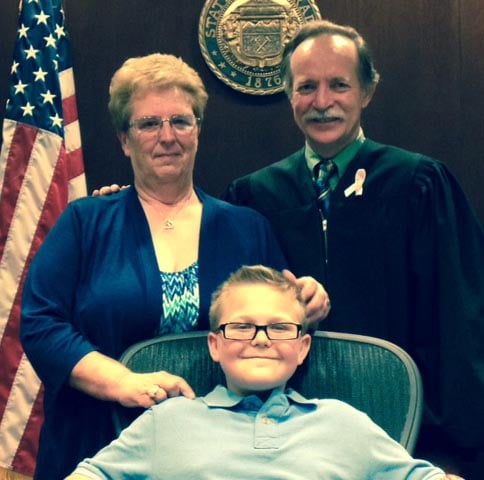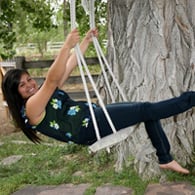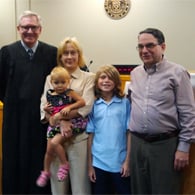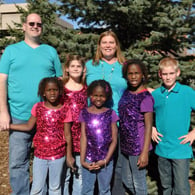Case Summaries
International Surrogacy Brings Sarah and Eric the Family They Always Dreamed Of
“Eric and I dreamed of having three children. We tried to get pregnant on our own, but it wasn’t working. Then I was diagnosed with endometrial cancer and had a hysterectomy. The only way I could have a biological child was with a surrogate. But that is illegal in France.”
Read More
In the United States, Colorado is one of the states where courts are favorable to surrogacy so Sarah turned to her family to help her find a surrogate she could trust. Sarah’s sister was a midwife and recommended a colleague who wanted to be a surrogate, Amiee, who agreed to help them.
The couple decided they didn’t want an agency involved since they found a surrogate on their own, and everyone wanted to have direct communication throughout the process. This made identifying an experienced attorney even more important. “Because we were not using an agency, it was vital we find an attorney who was experienced in surrogacy to guide us through the process,” says Sarah.
Sarah and Eric interviewed many attorneys before choosing Seth Grob. “We were reassured by his guidance. He laid out all the things we needed to discuss with our surrogate and helped us be sure she got everything she would have received if we had used an agency,” says Sarah.
“In surrogacy cases we draft legal contracts between the parties outlining their rights and responsibilities,” explains Seth. “It is very important to explicitly state the intent of the parties. Because there is no surrogacy statute in Colorado it is critically important to set forth that the intended parents should be recognized as the legal parents of the child born to the surrogate, and that the surrogate has no legal rights or responsibilities to the child. Once a pregnancy results, we rely upon the parties’ intentions and the contract to obtain a court parentage order prior to delivery finding that the intended parents are the legal parents of the child immediately upon birth.”
“Seth also helped us think through what to do if things went wrong,” says Sarah. “For instance, what if we had more babies than was safe to carry or what if the surrogate needed to go on bed rest – that was a major financial risk. We also needed a second set of guardians in case we both died during the pregnancy. What I really appreciated was that there was a sense of normalcy when we talked to Seth; we weren’t doing something so different.”
During the process, Sarah and Eric traveled back to Colorado frequently for IVF treatments, the embryo transfer to the surrogate, midway through the pregnancy and a few weeks before the birth. Soon after their first child, Oscar, was born, they began discussing a second surrogacy. This time Sarah’s sister, Jessica B., wanted this altruistic job. Soon Viviane was born, and they knew they wanted to have a third child as they had always dreamed. They found another surrogate, Jessica T., who gave birth to their third child, Kennan, and thus completed their family. All three are Sarah and Eric’s biological children in that Sarah used her ova and Eric, his semen to create the resulting embryos that were later transferred to their respective surrogates.
“Sarah and Eric are the only family I’ve worked with where three children were born from three different surrogates. That was a first for me,” says Seth. “And with them living in France it added another layer of complexity to the process.”
Sarah says being half a world away from her surrogates wasn’t so bad. “Six years ago when we started I participated in the doctor’s visits via phone. For the second and third pregnancies, I was at every appointment via video. I didn’t feel disconnected; technology made me feel like I was there.”

From left to right: Aimee and Oscar, born 2011; Jessica T. and Kennan, born 2015;
Sarah, Jessica B. and Viviane, born 2013
Photography by Katy Tartakoff, katytartakoff.com
Laws are beginning to change in France. In 2015, the top French court ruled that children born from surrogacy in other nations to French parents will now be granted French citizenship. But surrogacy is still illegal, and Sarah explains that there are risks. “Our children have no other parents, yet in cases of divorce or death, child protection service could come and take our children away.”
Today Sarah and Eric work to help change the law. “We are one of the few families who are willing to talk to the media about our story and our process to help change the law,” says Sarah. In fact, one media outlet traveled to Colorado and interviewed Seth on his role in helping Sarah and Eric.
Sarah says working with Seth was easy because of his knowledge and professionalism. “I found Seth to be organized, precise, proactive and respectful of our timelines. For the French process, he had to reissue some documents on very tight timelines, and he was always able to do that. Surrogacy is a very big project to undertake and having a lawyer who is trustworthy and experienced can make the process much easier.”
Adoption and Immigration Expertise Create Path to a Brighter Future
“I have a little girl and I don’t want her. I don’t want a brat to spoil my life. Godmother, if you want her you need to come get her or I will give her away to someone else.”
Read More
Vera and her husband, Jesus, already had four children of their own; the youngest was 8 years old. They discussed taking Nella, and before long, Vera and her sister were on their way to pick up the infant.
When they arrived, Nella was handed over with just a t-shirt and a diaper. “I’m positive. Take her. I have to move on with my life,” said the mother. And then she was gone. Vera and Jesus never heard from her again. That was fifteen years ago.
Vera and Jesus raised Nella as their own, never telling her the story of her birth mother. Over the years, Jesus tried many ways to get in touch with his niece without any success. Vera kept her same phone number for all that time, but Nella’s mother never called.
When Nella started elementary school, a birth certificate was requested. Vera said she had turned it in, and school officials never asked again. When Nella visited the doctor, Vera showed her school ID. In junior high, Nella’s paperwork transferred from the elementary school. Even when she started high school and her birth certificate was asked for again, Vera said she would need to request a new one since the original was lost by the elementary school.
No one ever followed up, until Nella was 13 years old and caught by a police officer for being out past curfew. “That was when I really faced it,” said Vera. “The officer said she needed an ID, and the school ID wasn’t sufficient. I knew we needed to do something.”
“But all this time I wasn’t waiting, and I had inquired with other attorneys,” Vera explained. “They said nothing could be done in the States. I would have to go to Mexico, adopt her there, and then bring her back to the U.S. But I couldn’t take her to Mexico. What if I had to leave her there?”
“Finally one of the attorneys recommended Mr. Seth,” said Vera. “I went to see him and that was when the light at the end of the tunnel appeared. He was so kind and peaceful. He transmits a lot of peace. Not promises because he can’t make promises, but I felt comfort that there is a possibility. It wasn’t the doubt I felt with other attorneys.”
But to move forward, Nella would have to consent to the proceedings, which meant she would need to be told about her birth mother and the story on how she had come to live with Vera and Jesus.
“It was the most difficult thing,” said Vera. “She had a lot of questions and cried a lot, but I said ‘I took you in with open arms and no matter what anyone says, you are my child. The Lord brought you to me.”

The extended family. Nella is second from left. Jesus and Vera are sixth and seventh from left.
Seth began work on the case and first successfully secured permanent legal guardianship for Vera and Jesus. Then Seth, on behalf of Nella, applied for and was granted Special Immigrant Juvenile Status (SIJS). SIJS is a federal law that assists in obtaining a permanent visa for undocumented children who have been subjected to abuse, neglect and abandonment by a parent, and whose best interest is not to return to their country of origin. Nella now has a green card allowing her to legally live and work in the United States.
“There are legal pathways available to these kids, and many lawyers don’t know about them,” said Seth Grob. “At Grob & Eirich, we are unique in that we have joint expertise in adoption and immigration. We will always staff these cases with two attorneys, one an expert in adoption law and the other in immigration law. Our immigration expert, Katie Glynn, was also involved in this case and brought a lot of experience and knowledge to this situation.”
Now Vera and Jesus want to adopt Nella. An adoption suit has now been filed and is pending in the Colorado District Court. If the adoption is completed before Nella turns 16, she will be able to obtain citizenship two years after the adoption.
“It was important that Nella obtained legal status while she was a minor,” said Seth. “Without it, she would forever be subject to deportation to a country she didn’t know. She would not be able to get gainful employment, pay in state tuition for college, or utilize any public benefits.”
“I am very pleased with the work Mr. Seth has done,” said Vera. “I would definitely recommend him. It’s not easy, believe me, but if there was a case similar to this, I would say don’t give up. Not all the attorneys have all the knowledge, but Mr. Seth does.”
* All names in this story have been changed.
Through Adoption, Grandparents Take on the Challenge of a New Generation
In the United States, one million children live with a grandparent in a home where neither parent lives, according to AARP. For a variety of reasons, a lot of children grow up being raised by grandparents.
Read More
Many grandparents want legal authority over the children in their care in order to enroll them in school, make medical decisions, or add them to their health insurance. Adoption also protects the children financially if grandparents become sick or die and allows grandparents to choose an appropriate caretaker in their absence.
Grob & Eirich assist grandparents in adoption proceedings, in both private kinship adoption proceedings and public abuse and neglect cases.
Under Colorado law, before pursuing a private Kinship adoption, the child must live with the grandparents for at least one year. Additionally, it must be demonstrated that the birth parents are consenting to their parental rights being terminated and the adoption or have either abandoned the child for a period of one year or more or the birth parents have failed without cause to provide reasonable support for a period of one year or more. The court must also make a best interests determination based on many factors, including but not limited to, the family stability, the present and future effects of adoption, the child’s emotional ties and interaction with the parties, the child’s adjustment to the living situation, the child’s age, and the mental and physical health and of the grandparents and other parties. The grandparents need to prove by clear and convincing evidence that being adopted by them is in the best interest of the child.
Diane
As an infant in Texas, Daniel lived in a home filled with drugs, alcohol, and violence. When he was almost one year old, he was placed in protective services. Then Diane, his maternal grandmother, began to care for him after his father was jailed for shooting someone.
“Daniel celebrated his first birthday with me,” Diane said. “I’ve taken care of him, raised him, watched him grow and play football.”
Diane raised Daniel for nine years, and in 2013, when Daniel was 10, she decided to adopt him. Daniel really wanted to be adopted and to change his last name.
Diane didn’t know who could help her with the adoption until someone suggested Seth Grob.
“Seth is awesome,” Diane said. “He told me everything I needed to know, what we had to do, even the worst case scenario. I had a lot of questions, and he took the time to answer them. Even through my biggest fear of losing Daniel, Seth kept me calm.”
“We searched everywhere for Daniel’s biological parents, but we couldn’t locate them,” said Seth. “That made it easier for the court to terminate the birth parents’ parental rights based upon abandonment and lack of support.”
With Seth’s expert assistance, the adoption process moved quickly, starting in January and completing in June 2014.
Daniel was so excited about being adopted by his grandmother that he jumped up and down in the courtroom and insisted he get a picture taken with the judge.
“Seth would be the best choice for anyone wanting to adopt,” Diane said. “He will do everything in his power to help.”
Penny and Michael

When Indie was just 18 months old, her mother overdosed on drugs and her father, who was separated from the mother but also struggled with drugs, wasn’t able to care for her. Penny and Michael, Indie’s grandparents, went to get their granddaughter in the middle of the night and began to care for her.
“When we got her, Indie wouldn’t respond to her name,” Penny said. “Previous parenting had been by TV, and she was neglected. I was so thankful we got her when we did.”
Penny and Michael did not believe an Allocation of Parental Responsibility, where parents not only maintain their legal relationship with the child but also can modify the court’s orders, was in Indie’s best interest. Rather, they wanted to fully adopt their granddaughter and provide her with the stability and permanency that only adoption could provide.
Tim said it wouldn’t be easy to adopt Indie, due to the nature of dependency and neglect cases, but if the parents were not able to successfully complete their treatment plan, Penny and Michael could adopt, and he would represent them.
“Tim told us we could be an ‘intervenor’ to the court so we would get all correspondence on the case and we could know what was going on,” Penny said. “We couldn’t overrule anything, but we could vocalize our concerns.”
“The grandparents’ involvement was integral,” Tim explained. “Both parents were substance abusers, unstable, and very manipulative. The mother disappeared, and the father’s rights had to be involuntarily terminated. Penny and Michael provided important information regarding not only their granddaughter’s needs but also the father’s history of illegal business dealings and drugs use. The grandparents credibility was high with the judge due to their substantial history with both parents. Without the grandparents’ involvement in the proceedings, the judge would not have had all the information to make an informed and deliberate decision about the child’s future.”
“Tim was with us at every court hearing and explained everything to us in English instead of legal lingo,” Penny said. “He also spoke up on our behalf. One time Indie’s father wanted unsupervised visits, and the caseworker didn’t say why this was a bad idea. Tim represented our perspective for the court, and the court agreed with us.”
Termination of parental rights was finalized in spring 2014 after 18 months of court process. Penny and Michael officially adopted their 3-year-old granddaughter, Indie, on November 22, National Adoption Day.
“Tim was awesome to work with,” Penny said. “We’ve recommended Tim to many people who have nonconventional adoptions. We have complete confidence in him.”
The Story of Eli and Gabi
The Importance of Expertise in Stepparent Adoptions
Eli was 7 years old when he started writing a new name on his papers at school, Eli Nichols instead of Eli Kalb. When teachers would call him Eli Kalb, he would say, “Don’t call me that. I don’t want that to be my name. I want the same name as mommy and daddy.”
Read More
Eli’s mother, Orna, had divorced Eli’s father three years earlier, married Daniel Nichols and taken Nichols as her last name. Once Eli began requesting to be identified as a “Nichols,” Orna and Daniel decided the time had come for a stepparent adoption.
It had been years since any of them had heard from Eli’s father, Hassan Kalb. He had said he didn’t want to see Eli, or his sister, Gabi, and had made no effort to contact them in several years.
But they knew pursuing a stepparent adoption could be stressful and complicated. During their relationship, Hassan had been verbally and physically abusive toward Orna and the children. For example, when Gabi was 3 years old she had made a mess with tissues in the upstairs bathroom. Orna’s sister, Amy, was visiting and recalled what happened:
“Hassan started yelling at Gabi about the mess,” Amy said. “Then he kicked her in her stomach so hard that her little body flew into the wall. I was literally in shock. I had never seen anyone do anything like that to a child. Gabi lay there for a few seconds and then she ran upstairs to hide from him. I went upstairs to look for her and eventually found her curled up in the back of her mom’s closet crying quietly. Hassan left for work and didn’t even bother to check on her.”
Orna had tried to leave the abusive relationship many times, but she’d always returned. Then finally, in 2008, she had enough. She escaped with the children to a home for abused mothers and children. The organization helped her to get a temporary restraining order.
“That was my escape. It was over for me,” Orna said. She divorced Hassan, then met and married Daniel.
Hassan had scheduled visitations with the children, but it was only one weekend a month. He often cancelled or didn’t show up, which meant months passed between visitation meetings. Hassan also continued his terrorizing behavior.
“There was a constant threat that he would send the children to the Middle East to be raised by his mother,” Orna said.
Even though Orna had found a good job, for everyone’s safety, they decided they had to leave. The family moved from the Midwest to Colorado in 2010.
Two years later, when Orna and Daniel decided to pursue the stepparent adoption, they met with Seth Grob who assigned the case to Tim Eirich given his experience in contested litigation. Orna was nervous about trusting Tim at first.
“It was like I was putting our kids’ lives in his hands-like a surgeon [with my kids] on the table,” Orna said.
Her husband, Daniel, recalled when he started to trust Tim. “The first time Orna broke down in the office while telling her story, that was when Tim had emotion in it too. We knew he was on our side. He was doing everything he could to win the case for us and for the kids, not just for the law firm.”
On the first day in court, Tim presented his opening statement from the children’s points of view.
“When he gave that opening statement, it was as if he was the children,” Orna said. “A six-foot man speaking as if he was four feet tall. Then, I knew he was in 100%.”
Ondine Craig, Tim and Seth’s legal assistant, played an important supportive role. “Ondine was amazing in helping me feel comfortable in the court room knowing I had to face my abusive ex-husband after almost five years,” said Orna. “Ondine kept me calm and sane. She is a valuable asset to the firm.”
In order to prevail, Tim had to prove two facts: that the termination of Hassan’s parental rights, and the subsequent adoption by Daniel, was in the children’s best interests and that Hassan had abandoned the children for twelve months or more. Hassan’s attorneys argued that the restraining order had prohibited Hassan from seeing the children and that Orna had kidnapped the children from the Midwest.
After three full days of trial, during which both sides called expert witnesses, the court ultimately agreed with Tim’s arguments and terminated Hassan’s parental rights and Daniel legally adopted the children.
“We handle contested litigation cases like this one, and we do them well,” Tim Eirich said. “Terminating parental rights is a serious matter under the law and we take these cases very seriously. As such, it’s important to work with specialists who not only know the Children’s Code but also can litigate well. “
“Tim won my trust,” Orna said. “Even if it had gone the other way, I know I had the best man for the job. And I have never been with a more compassionate attorney. Tim cared about my mental state, emotional state and physical state. It still brings tears to my eyes.”
All names in this story have been changed.
Zayden Gets the Family and Resources He Needs

Zayden’s early life was horrific. While pregnant, his biological mother suffered a brutal sexual assault in which she was raped and beaten. As a result, Zayden suffered a blood cot on his brain in-utero. After birth, Zayden’s developmental and physical delays were profound. He was very small, completely blind and could not move on his own. He was self-isolated and didn’t interact with others. He was unable to make any sounds; even his cries were silent. His medical needs were extensive with many long stays in the hospital for surgeries or infections.
Read More
“With my wife’s medical background we thought we might be a good fit,” said Justin. “We decided his delays would not make him an outsider in our family. We started visiting him and got to know him. We had small interactions where he smiled and leaned in our direction – that spoke volumes. We fell in love with him and decided we wanted to adopt him.”
The medical expenses for Zayden were massive and Adoption Options held a fundraiser. The Daleys attended with Zayden and had the opportunity to tell their story. Tim Eirich, attorney with Grob & Eirich, LLC, attended that fundraiser and, while at the event, offered his services pro bono. “We wanted to give back to the community and thought this case was a great way to do that,” said Tim Eirich.

Tim Eirich’s work focused on securing the subsidies Zayden’s new family would need to be able to care for him. “The medical and special needs of a child can manifest as a barrier to adoption,” said Tim Eirich. “You have to advocate for a child to get the necessary resources and you have to do it before the child is adopted. The family that pushes the hardest often gets the most.”
The county originally offered Medicaid but nothing more. This wasn’t enough to get Zayden what he needed. The medical, equipment and other expenses were significant. For instance the Daleys had two incomes before Zayden but his care required that Lindsay stay home. When Zayden needed to stay in the hospital, Justin couldn’t work and their older child needed daycare. Additionally, due to Zayden’s medical condition, he could not be left alone with anyone who did not have the proper medical training.

“I was so thankful for Tim. The legal process with the county was so much to navigate. Without Tim it would have been overwhelming. We trusted his guidance and could focus on making Zayden part of our family.”
Tim Eirich negotiated with the county for almost a year and finally secured a monthly cash assistance subsidy until Zayden turns 21 years old. The Daleys were then able to legally adopt Zayden.
“We don’t know how functional Zayden will be as an adult but we hope this subsidy will set him up for his future,” said Justin. “That piece of mind is key for any parent.”
“The subsidy we were able to secure certainly won’t cover all of Zayden’s expenses, but it will be a big help to the family,” said Tim Eirich.
Today Zayden is 3 years old. He can crawl on his own and loves to play. He laughs, squeaks and cries. He receives physical, speech and occupational therapy. He has a baby walker and loves to chase his older brother and the dog. His vision has improved and he can see about three feet in front of him. Additionally his tracheotomy was recently removed and his stays at the hospital are fewer.
“We are so appreciative of Tim,” said Justin. “His expertise, guidance and wisdom, but more so, his genuine passion, were so important. And we were so thankful he was doing all of it pro bono. Today Zayden reaches for me when he wants to be picked up. He also loves to hug and give kisses.”

Same Sex Couple Legally Recognized as Equal Parents Without an Adoption
A recent decision by the Colorado Court of Appeals, In re Parental Responsibilities of A.R.L., a Child, issued on December 5, 2013, has changed the preference of parentage that biological parents usually receive. The decision reversed a trial court ruling and concluded, “In the context of a same-sex relationship, a child may have two mothers… a biological mother and a presumptive mother.”
Read More
This is the first time in Colorado that a non-biological parent in a same-sex relationship is legally recognized as an equal parent without an adoption being completed.
“I’ve been advocating this a long time in assisted reproduction cases,” said Seth Grob. “When a non-biological parent holds him or herself out as a parent and intends to be a parent prior to the embryo implementation, the non-genetic partner or spouse should be legally recognized as an equal parent, without having to do an adoption.”
As a result of this ruling, Seth recently filed for and was successful in obtaining a pre-birth court order establishing a same sex male couple as the legal parents of a child. Seth used the appellate case and the new civil union law to successfully argue that they should both be recognized as the legal parents and have their names placed on the birth certificate upon delivery. No mother will be recognized as the legal parent of the child per the client’s wishes.
“This is the first time I have been successful in doing this,” said Seth Grob. “Previous to this case, we always needed to do a second-parent adoption following the child’s birth to allow the non-genetic partner to be legally recognized as a parent. It’s a very important ruling and will make it easier and less expensive for same sex couples in Colorado to now be recognized as legal parents.”
Joselyn On The Road to Legal Residency After Years of Struggle
Joselyn came to the United States from Mexico when she was just 6 years old. She lived with her birth mother and her partner, Neta Hansen, for many years; however, Neta was always Joselyn’s primary caregiver. Eventually the birth mother left and Neta became Joselyn’s sole caregiver and happily took on the responsibility of raising Joselyn.
Read More
Despite the crushing setback, Neta spent three years working with another attorney in Mexico, as well as an immigration attorney in the United States. Her frustration grew. Finally, she was referred to Seth Grob.
Seth immediately filed in the Colorado District Court for allocation of parental responsibilities (APR) and for findings establishing eligibility for special immigrant juvenile status (SIJS). This status is granted to immigrant children who were abused, neglected or abandoned by one of their birth parents and when it is not in their best interests to return to their country of origin. If eligibility is established, the child can obtain a green card through the program and legally work and live permanently in the U.S.
However, there was one problem. After all this time, Joselyn was about to turn 18. Although Seth was able to file the APR petition while she was 17, the case was not heard until after her eighteenth birthday. On this basis alone, the district court magistrate dismissed the case determining that as matter of law, the child was emancipated and the Colorado court did not have jurisdiction to enter any APR orders or SIJS findings. Once again, Neta felt hopeless.
Together, Seth and Neta discussed the options. Seth consulted with other attorneys, most of whom advised against an appeal. But Seth didn’t want to give up so he petitioned to have the magistrate’s order reviewed by a district court judge, arguing that 18 is not a designated age of maturity by the pertinent laws. On appeal, the judge agreed with Seth’s argument and reversed the magistrate’s decision.
Allocation of parental responsibilities was thereafter granted, as was findings for special immigrant juvenile status. Joselyn has now initiated an application to receive permanent legal residency which is expected to be granted and will allow Joselyn to legally remain in the U.S. Joselyn proudly graduated from high school this year and is working her first job.
“This is an important case because it expands the remedies that are available to older kids who have been brought to this country at a young age, have lived here a long time, and who have been fully assimilated into our country” said Seth. “Joselyn now has opportunities she never would have had.”
“I wish we had known Seth when we started all of this. It could have saved us nine years,” said Neta. “Now Joselyn is looking forward to college. She is excited to get on an airplane for the first time and get a driver’s license. We used to live in fear that our family would be split up. We had to plan our vacations around border checks. Now we can just enjoy life and be free.”



Russian Children, Rolan and Kira, Find Forever Home in Colorado
In Russia, where Rolan was born, his mother was diagnosed with schizophrenia, was an alcoholic and a drug addict. His father also abused alcohol and drugs. However Rolan’s circumstances improved dramatically when he went to live with his grandmother in the Russian countryside at 9 months old.
Read More
Fortunately for Kira and Rolan, they had an aunt and uncle in the United States. Anya and Jim Anderson lived in Colorado. In 2011 and again in 2012 the children came to visit the Andersons and stayed for many months.
In a political move, Russia banned international adoptions in January 2013. Rolan and Kira had stayed with the Andersons since November of 2012 but their visas were expiring. With this change in adoption policy, the Andersons were terrified to send the young children back to Russia. Their parents’ rights had been terminated in June in Russia and there was no one in that country who could care for the children. If returned to Russia, they would be immediately placed in an orphanage without any opportunity to come back to the U.S. given that foreign adoptions were now completely shut off by the Russian government. The Andersons feared they would never see Kira and Rolan again.
Anya searched for an attorney. “When I was doing the research Seth was recommended by several adoption agencies,” said Anya. “I needed someone who understood both immigration and adoption. He was the only one who could do both.

Seth filed for approval of adoptive placement, motion for temporary care and custody, and findings regarding eligibility for special immigrant juvenile status (SIJS). Seth argued that the children had been in the Anderson’s care over a year collectively and therefore the Court had jurisdiction. All motions were granted. Thereafter, the children received permanent legal residency by the United States Citizenship and Immigration Services and in August 2013, the children were legally adopted in Colorado.
“We came up with a creative solution that required an understanding of kinship adoptions, immigration, and knowledge of international adoption law,” said Seth Grob. “Kira and Rolan may have been trapped in Russia forever if they had left the U.S.”
*All client names have been changed.
Persuasive Legal Argument Avoids Costly Trial and Allows A Foster Child to Remain With Her Forever Family

Amy was 6 years old and Katlyn was almost 2 when they were placed with the Reeds who were interested in adopting them. The years of horrible neglect had finally come to an end. The Reeds provided a safe and secure home for the siblings, along with their three biological children.
Read More
Finally after 3 years, a therapist and the Reeds recognized that they were probably not the best family for Amy. The therapist recommended Amy be placed with a family that had no other children and could better manage her special needs. The Reeds were conflicted, but agreed and asked the County Department of Human Services to help find Amy a new home. However the County stated that not just Amy, but also her younger sister Katlyn, would be removed from the home.
The Reeds were distraught. Katlyn was just 5 years old and had lived with them for more than half of her life. She was very attached to them. To remove her from their home would be devastating for Katlyn’s well being. That’s when they called Grob & Eirich, LLC.
Tim Eirich handled the case and made it clear that the Reeds would fight to keep Katlyn in their home. Prior to trial, Tim filed a legal brief arguing that Katlyn was in a permanent home, according to Colorado law, and could not be removed from the Reeds’ home. Tim utilized a very important, but often ignored, Colorado statute that requires young children in the foster care system to be placed in a permanent home within one year unless a court makes specific legal findings by a very high legal standard. The judge agreed and issued an order before the trial began as to what the County would need to prove in order to remove Katlyn. Based on the trial court’s ruling, the County conceded that they did not have the evidence to remove Katlyn from the Reeds’ home. Due to Tim’s legal argument, an emotional, litigious, and expensive trial was avoided.
“While there is a legal presumption that siblings should be adopted together, it does always mean they need to remain together in the same home at all costs. Each child’s needs must be considered individually,” said Tim Eirich. “Sibling relationships are important, especially for foster kids, but they are not more important than a parent/child relationship. Attaching to a child’s caregivers is the most important relationship in a child’s life. Therapists told us that children who are unable to attach to their parents have difficulty establishing healthy relationships for the rest of their lives. I’m so glad we were able to keep Katlyn with the parents who love her.”
Importantly, the sisters will remain connected: Amy found a new home with a couple that does not have other children, and the Reeds adopted Katyln just last month. The sisters regularly visit and play together often.
Adoption Dissolution Can Have Happy Endings
Malia, Victoria and Samantha were already orphans awaiting adoption with families in the United States when a catastrophic 7.0 earthquake struck their homeland of Haiti on January 12, 2010. Within a week, the U.S. airlifted over 40 children for expedited adoptions and a path to citizenship.
Read More
Samantha was then sent to Colorado for respite care with a caregiver who had a child from the same orphanage in Haiti. But due to her own health issues, she approached a friend, Nancy, to ask if she wanted to spend some time with Samantha. After a careful transition of visits and overnights, Samantha was permanently placed in Nancy’s home in July 2012 and was fully adopted in December 2012.
“I don’t think the couple from California had any idea what they were getting into,” said Nancy. “If Samantha is upset she absolutely has to have water, as they were without water after the earthquake. And she wants to know where I am. She still sleeps on my bedroom floor every night. My other children have grown, but I thought maybe there is a reason I have this big property, not just for myself. I want to share it with someone else.”
Malia and Victoria were five and nine years old when the earthquake hit. These sisters were first adopted by a couple in Colorado in September 2010. From the beginning the children did not integrate well into the family and by April 2012 the adoptive parents said they could not care for them anymore. Lael and Kevin knew the adoptive couple, went to the same church and had also adopted another girl from Haiti. They offered to take the girls and shortly thereafter the girls were placed into their care and custody. In November 2012 the first adoptions were dissolved and Malia and Victoria were thereafter adopted by Lael and Kevin.
“The girls came to us diagnosed with ADHD and were traumatized,” said Lael. “We got them into counseling and got extra help at school and they stated blossoming. Now they have no conditions and are not on medication. And most important they seem really happy. I’m very thankful to God that He brought our daughters home. Their first family was just a stepping-stone and I’m glad they gave them up. They would not have grown up happy in that family.”
“It’s important to realize that sometimes adoption dissolution is necessary and can still lead to a happy ending for the children involved,” said Seth Grob. “These two stories are similar in that the children were initially cared for by parents who wanted to do the right thing but ended up unprepared for the challenges of raising these children who had been through so much trauma. Adoption dissolution may happen when expectations are too high, the children don’t integrate well with siblings, the children don’t attach to the family or it just isn’t a good match. But these initial families were critical bridges to their subsequent permanent adoptive families here in Colorado. I’m proud to have been part of finalizing both of these adoptions and finding these girls their forever homes.”

The Harrelson Family. Victoria is the taller one in purple and Malia is wearing pink.
Legal Victory for a Child’s Attachment
 Monica was just one year old when Gina and Jeff Wilson first met her. She was a foster child who was living with good friends of the Wilsons’, but it was a temporary foster home. Gina and Jeff saw Monica every week and got to know her. They decided to become licensed foster parents themselves so that Monica could join their family. When she was two years old, the county Department of Human Services allowed her to live with the Wilsons who wanted to adopt her as soon as possible.
Monica was just one year old when Gina and Jeff Wilson first met her. She was a foster child who was living with good friends of the Wilsons’, but it was a temporary foster home. Gina and Jeff saw Monica every week and got to know her. They decided to become licensed foster parents themselves so that Monica could join their family. When she was two years old, the county Department of Human Services allowed her to live with the Wilsons who wanted to adopt her as soon as possible.
Read More
The Wilsons retained attorney Tim Eirich from Grob & Eirich, LLC, to represent them and argue that Monica should stay in their home permanently. Before the trial began there was significant pretrial litigation that went to the Colorado Supreme Court. Additionally the trial court judge had initially written in an order that he was planning on moving the child. His position was that children always do better with family, and since a family member was located, the child should be removed.
Tim’s argument was that while biological family is important in many cases, attachment is more important. Monica was now three years old and had already been living with the Wilsons over a year, known them two years, and called them mom and dad. The Wilsons were the child’s psychological parents. At trial Tim endorsed two experts who testified that a child of Monica’s age undergoes a “critical bonding and attachment process” and that Monica will suffer “significant emotional damage” if she was removed from the Wilsons. After four days of trial and ten witnesses, the Judge ruled in favor of the Wilsons. The Wilsons will shortly be adopting Monica and making her a permanent member of their family.
“Gina and Jeff fought for this little girl despite the judge and other attorneys telling us we were going to lose. This was a fight worth fighting so that Monica could stay with the only people she had ever considered her parents.” – Tim Eirich, Senior Associate
* All names have been changed
